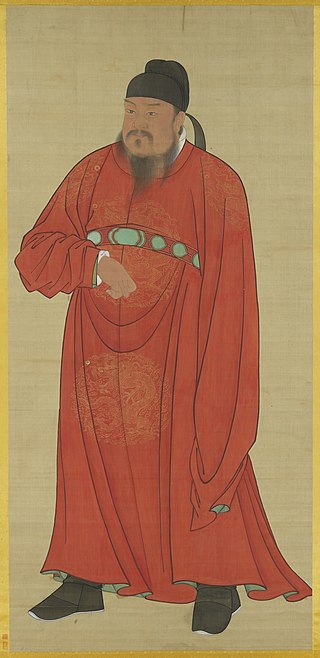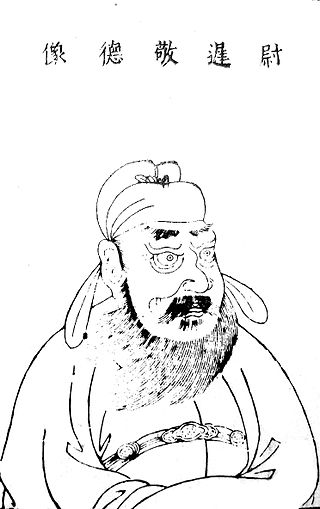Related Research Articles

Emperor Taizong of Tang, previously Prince of Qin, personal name Li Shimin, was the second emperor of the Tang dynasty of China, ruling from 626 to 649. He is traditionally regarded as a co-founder of the dynasty for his role in encouraging his father Li Yuan to rebel against the Sui dynasty at Jinyang in 617. Taizong subsequently played a pivotal role in defeating several of the dynasty's most dangerous opponents and solidifying its rule over China proper.

Emperor Gaozu of Tang, born Li Yuan, courtesy name Shude, was the founding emperor of the Tang dynasty of China, reigning from 618 to 626. Under the Sui dynasty, Li Yuan was the governor in the area of modern-day Shanxi, and was based in Taiyuan.

Wei Zheng, courtesy name Xuancheng, posthumously known as Duke Wenzhen of Zheng, was a Chinese politician and historian. He served as a chancellor of the Tang dynasty for about 13 years during the reign of Emperor Taizong. He was also the lead editor of the official history of the Sui dynasty, the Book of Sui, which was composed in 636.
Feng Lun, courtesy name Deyi, better known as Feng Deyi, formally Duke Miao of Mi, was a Chinese official of the Sui and Tang dynasties who served as a chancellor during the reigns of Emperor Gaozu of Tang and Emperor Taizong of Tang. He was praised for his quick thinking but criticized by historians for his being overly attentive to the emperors' desires.
Pei Ji (570-629), courtesy name Xuanzhen, formally Duke of Hedong, was an important official and one-time chancellor of the Tang dynasty. He initially served as an official of the Sui dynasty and was one of the driving forces in persuading the general Li Yuan to rebel against Emperor Yang of Sui. He eventually assisted Li Yuan in founding the Tang dynasty as its Emperor Gaozu and was greatly honored in Emperor Gaozu's reign. After Emperor Gaozu's son Emperor Taizong became emperor in 626, Pei began to be accused of corruption and associations with witchcraft and was exiled. Emperor Taizong soon remembered Pei's contributions to Tang's founding and tried to recall him, but Pei died before he could do so.

Yuchi Gong (尉遲恭) or Yuchi Rong (尉遲融), courtesy name Jingde (敬德), also known by his posthumous name Duke Zhongwu of E, was a Chinese military general who lived in the early Tang dynasty. Yuchi Jingde and another general Qin Shubao are worshipped as door gods in Chinese folk religion.

Luo Yi, known during service to the Tang dynasty as Li Yi (李藝), courtesy name Ziyan (子延) or Ziting (子廷), was a Sui dynasty official who rose against the rule of Emperor Yang of Sui and occupied the modern Beijing region. He subsequently submitted to Emperor Gaozu of Tang and was created the Prince of Yan and granted the imperial surname of Li. He subsequently, in the struggle between Emperor Gaozu's sons Li Jiancheng the Crown Prince and Li Shimin the Prince of Qin, joined Li Jiancheng's faction. After Li Shimin killed Li Jiancheng in 626 and forced Emperor Gaozu to yield the throne to him, Li Yi was fearful, and he rebelled against Emperor Taizong in 627. He was soon defeated and killed.
Li Jiancheng (Chinese: 李建成; pinyin: Lǐ Jiànchéng; 589 – July 2, 626, formally Crown Prince Yin, nickname Vaishravana, was the first crown prince of the Chinese Tang dynasty. He was the oldest son of the founding emperor Emperor Gaozu and the crown prince after the founding of the dynasty in 618 CE.
Li Yuanji (李元吉), formally Prince La of Chao (巢剌王), more commonly known by the title of Prince of Qi (齊王), nickname Sanhu (三胡), was an imperial prince of the Chinese Tang dynasty. He was a son of the dynasty's founder Emperor Gaozu of Tang, and in the intense rivalry developed between his older brothers Li Jiancheng the Crown Prince and Li Shimin the Prince of Qin, he sided with Li Jiancheng and often advocated drastic actions against Li Shimin, including assassination. In 626, Li Shimin, fearing that Li Jiancheng and Li Yuanji were about to kill him, laid an ambush for them at Xuanwu Gate outside the palace and killed them. Li Shimin then effectively forced Emperor Gaozu to yield the throne to him.
Chen Shuda (572–635), courtesy name Zicong, formally Duke Zhong of Jiang, was an imperial prince of the Chen dynasty, who, after the destruction of Chen, served as an official under the Sui and Tang dynasties, becoming a chancellor during the reigns of the Tang emperors Gaozu and Taizong.
Yuwen Shiji, courtesy name Renren, formally Duke Zong of Ying, was a Chinese statesman and politician of the Sui and Tang dynasties, serving as a chancellor, as Shizhong (侍中) (625–626) and Zhongshu Ling (中書令) (626–627), during the reigns of Emperors Gaozu and Taizong of Tang. He was previously an imperial prince in the short-lived state of Xu (許), which was ruled by his brother Yuwen Huaji.
Pei Ju (547–627), birth name Pei Shiju, courtesy name Hongda, formally Duke Jing of Anyi, was a Chinese cartographer, diplomat, politician, and writer who lived in the Sui and Tang dynasties, briefly serving as a chancellor during the reign of Emperor Gaozu of Tang. He was praised by traditional Chinese historians for his ability and lack of corruption, but blamed for flattering Emperor Yang of Sui and practically directly contributing to Sui's downfall by encouraging many external military campaigns that drained Sui's resources. Modern historians have questioned these assessments: Arthur F. Wright labelled the latter judgement in the Zizhi tongjian a "particularly blatant piece of editorializing" and "absurd ... beyond doubt".

Xiao Yu, courtesy name Shiwen, posthumously known as Duke Zhenbian of Song, was an imperial prince of the Western Liang dynasty who later became an official under the Sui and Tang dynasties. He served as a chancellor during the reigns of the emperors Gaozu and Taizong in the early Tang dynasty.
Li Daozong (603?-656?), courtesy name Chengfan (承範), was an imperial prince of the Tang dynasty of China. He was a cousin of the Emperor Taizong, and during the Emperor Taizong's reign commanded forces in campaigns against the Eastern Tujue, Tuyuhun, Goguryeo, and Xueyantuo. In 653, during the reign of Emperor Taizong's son Emperor Gaozong, Li Daozong offended Emperor Gaozong's uncle, the powerful chancellor Zhangsun Wuji, and Zhangsun exiled him to Xiang Prefecture, on accusation that he associated with the treasonous Fang Yi'ai (房遺愛). Li Daozong died on the way to exile.

Fang Qiao, courtesy name Xuanling, better known as Fang Xuanling, posthumously known as Duke Wenzhao of Liang, was a Chinese statesman and writer who served as a chancellor under Emperor Taizong in the early Tang dynasty. He was the lead editor of the historical record Book of Jin and one of the most celebrated Tang dynasty chancellors. He and his colleague, Du Ruhui, were often described as role models for chancellors in imperial China.
Wen Dalin (575–637), courtesy name Yanbo, better known as Wen Yanbo, posthumously known as Duke Gong of Yu, was a Chinese official who lived in the early Tang dynasty. He was a key advisor to the Tang dynasty's founding emperor, Emperor Gaozu, and served as a chancellor during the reign of Gaozu's successor, Emperor Taizong. He was captured by the Göktürks and lived among them for years. After he was freed, he drew on his experiences to provide advice to Emperor Taizong on the Tang Empire's policies towards the Göktürks.

Gao Jian, courtesy name Shilian, better known as Gao Shilian, formally Duke Wenxian of Shen (申文獻公), was a Chinese politician of the Tang dynasty. He was the uncle of Empress Zhangsun, Emperor Taizong's wife, and a trusted advisor to Emperor Taizong.
Yang Shidao, courtesy name Jingyou, posthumously known as Duke Yi of Ande, was a Chinese politician who served as a chancellor during the reign of Emperor Taizong in the Tang dynasty.
Wang Gui (571–639), courtesy name Shujie, posthumously known as Duke Yi of Yongning, was a Chinese official who served as a chancellor during the reign of Emperor Taizong in the Tang dynasty. He had previously served Li Shimin's elder brother, Li Jiancheng, with whom Li Shimin was locked in an intense rivalry during the reign of their father, Emperor Gaozu, but after Li Shimin killed Li Jiancheng and then took the throne, he knew that Wang was faithful to Li Jiancheng and was capable, and therefore retained him, eventually making him chancellor. Wang was known for his honest and blunt criticism of the emperor, and for that was honored by Taizong, who appreciated such criticism.
Du Yan, courtesy name Zhili, posthumously known as Duke Xiang of Anji, was a Chinese official who served as a chancellor during the reign of Emperor Taizong in the Tang dynasty. His more famous nephew, Du Ruhui, was also a chancellor.
References
- Book of Sui , vol. 43.
- Old Book of Tang , vol. 62.
- New Book of Tang , vol. 100.
- Zizhi Tongjian , vols. 187, 188, 189, 190.